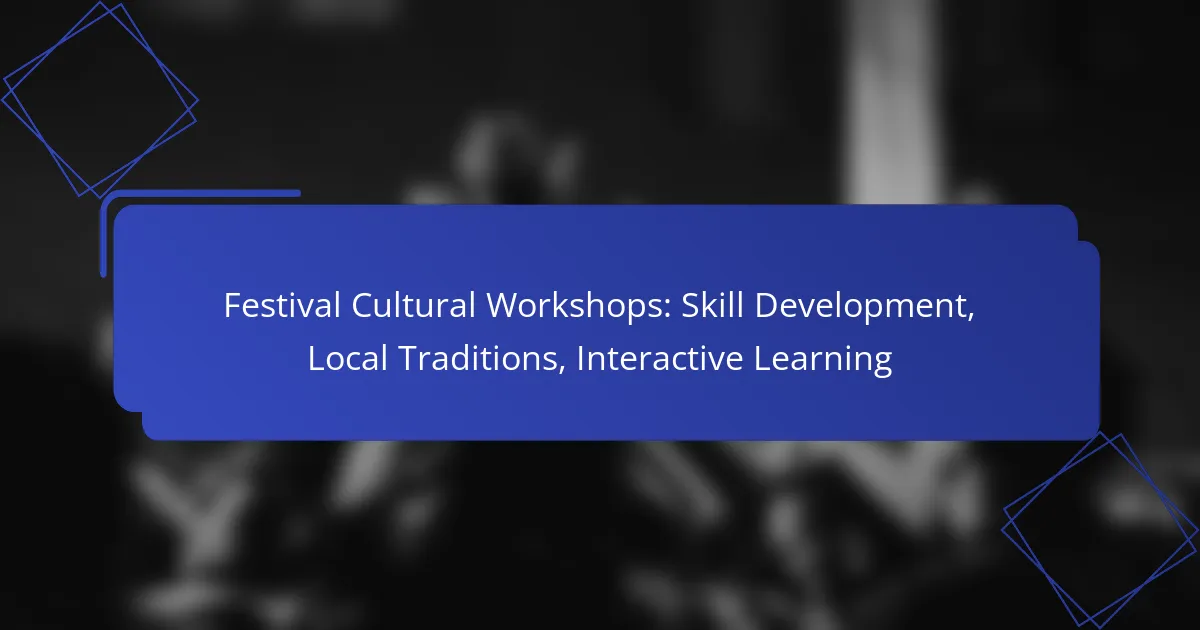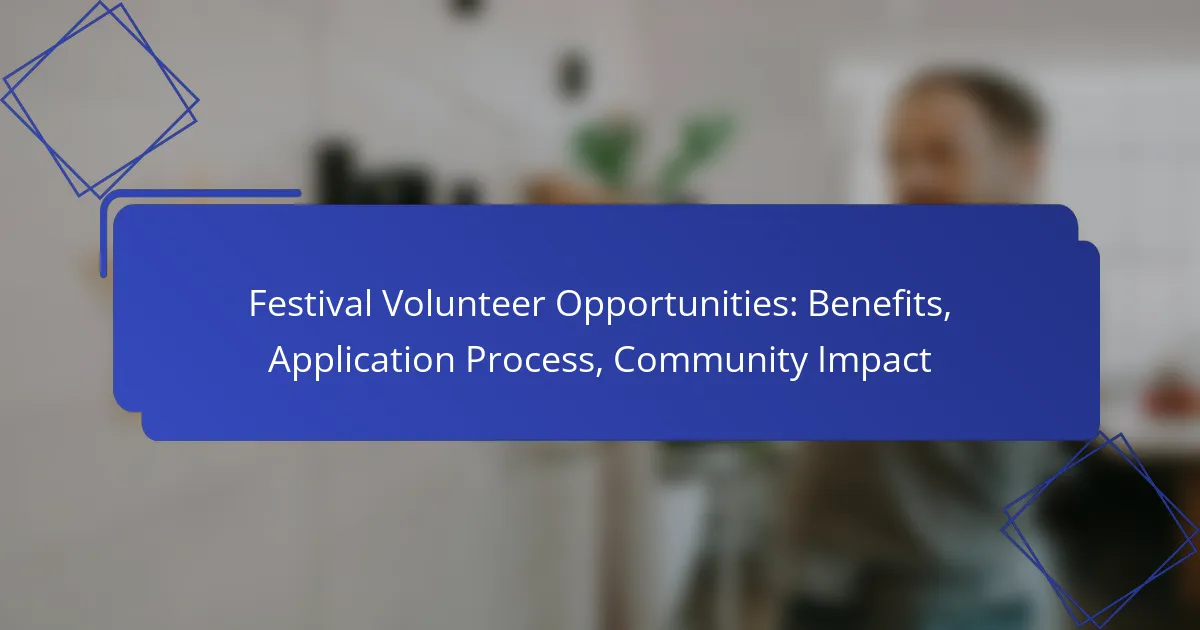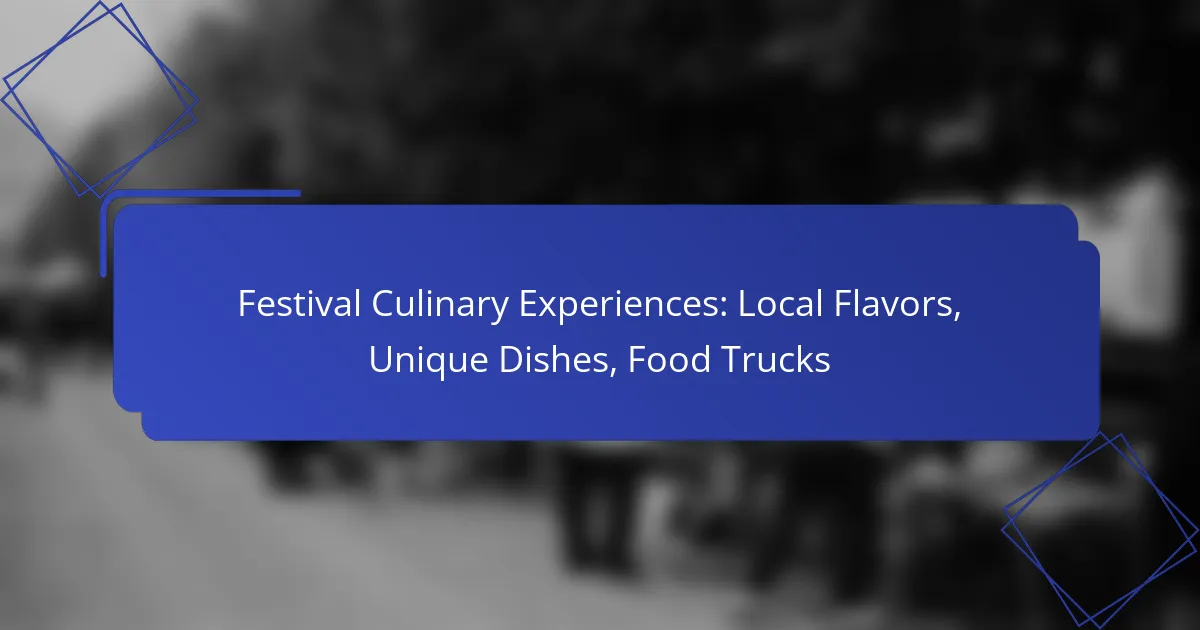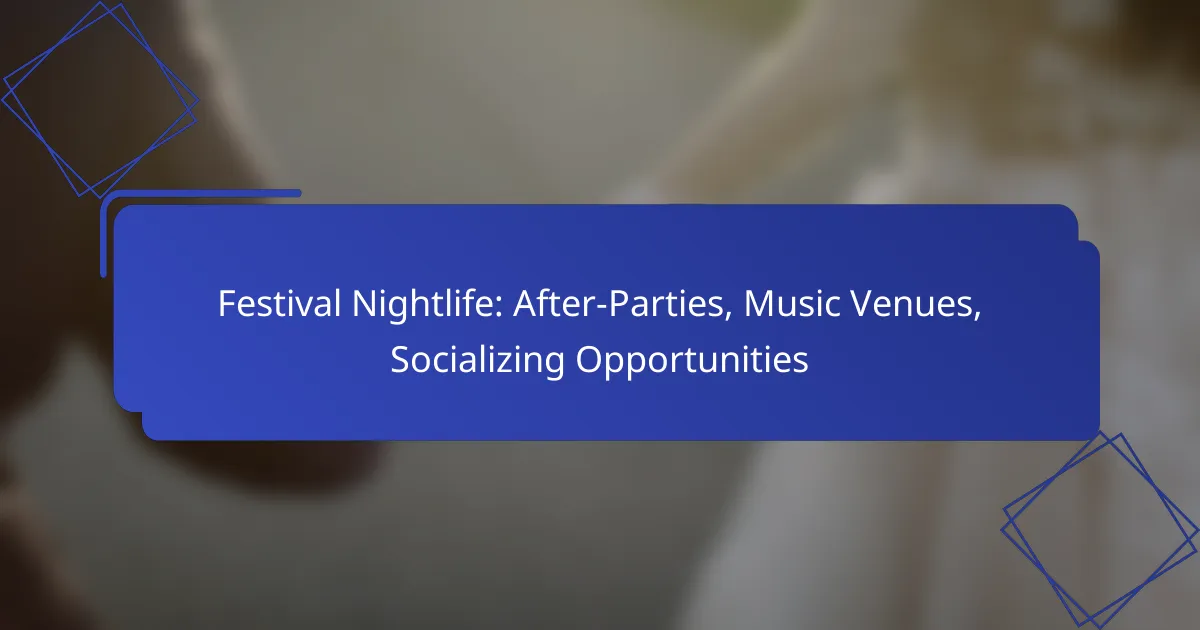Cultural workshops serve as a vibrant platform for skill development, immersing participants in local traditions through hands-on experiences. By engaging in activities such as cooking, art, and dance, individuals not only learn new skills but also deepen their appreciation for their community’s unique heritage. These interactive sessions are essential for preserving and promoting traditional practices, ensuring they thrive for future generations.
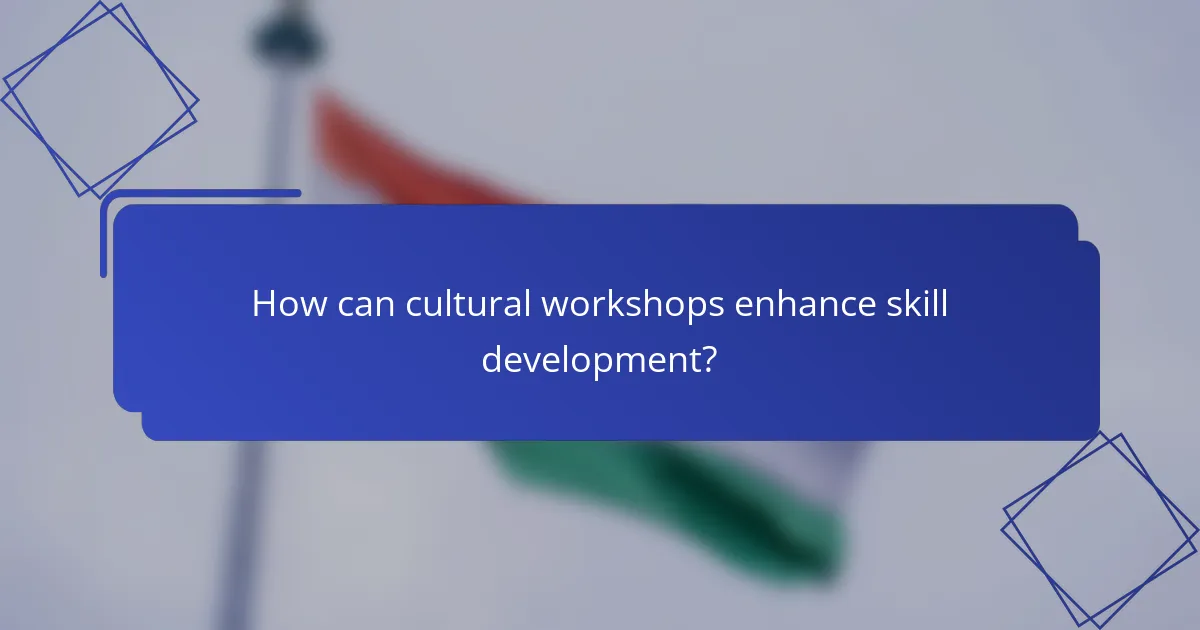
How can cultural workshops enhance skill development?
Cultural workshops enhance skill development by providing participants with practical, hands-on experiences that connect them to local traditions and techniques. These interactive learning environments foster creativity and allow individuals to acquire new skills while engaging with their community.
Hands-on experience with local artisans
Participating in workshops led by local artisans offers invaluable hands-on experience. Attendees can learn directly from experts who share their knowledge and techniques, creating a rich learning environment. This direct interaction not only enhances skill acquisition but also deepens appreciation for the craft.
Workshops often include demonstrations where artisans showcase their methods, allowing participants to observe and practice simultaneously. This immersive approach helps solidify skills through real-world application.
Learning traditional crafts and techniques
Cultural workshops focus on traditional crafts that reflect the heritage of a community. Participants can learn techniques such as pottery, weaving, or woodworking, which have been passed down through generations. Engaging with these crafts fosters a sense of connection to local history and culture.
Workshops typically provide all necessary materials, making it accessible for beginners. Participants can expect to leave with a completed project, reinforcing their newly acquired skills and knowledge.
Building community connections
Engaging in cultural workshops helps build strong community connections. Participants often meet like-minded individuals who share similar interests, creating a supportive network. This sense of belonging can enhance the overall learning experience.
Many workshops encourage collaboration, allowing participants to work together on projects. This teamwork not only fosters friendships but also encourages the sharing of ideas and techniques, enriching the learning process.
Boosting confidence through interactive learning
Interactive learning in cultural workshops boosts confidence by allowing participants to experiment and make mistakes in a supportive environment. As individuals practice new skills, they gain a sense of accomplishment that encourages further exploration and creativity.
Feedback from instructors and peers can also enhance self-esteem, as participants receive encouragement and constructive criticism. This positive reinforcement helps individuals feel more comfortable expressing their creativity and pursuing new challenges.
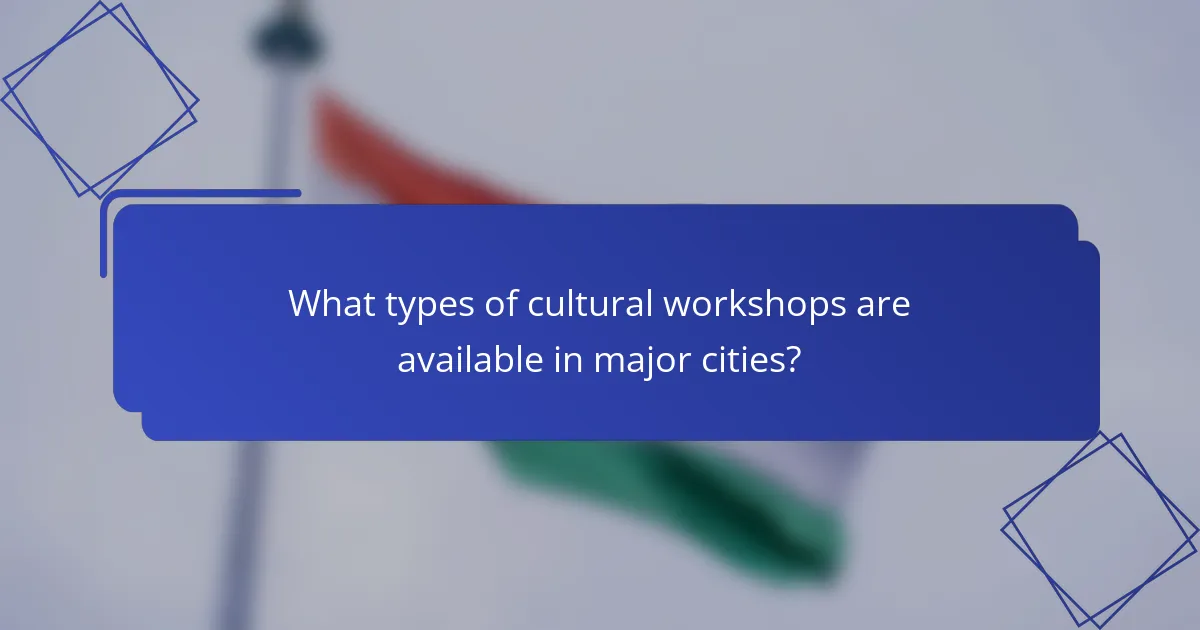
What types of cultural workshops are available in major cities?
Major cities offer a variety of cultural workshops that focus on skill development, local traditions, and interactive learning. Participants can engage in cooking classes, art workshops, and dance sessions that highlight the unique cultural heritage of the area.
Cooking classes featuring regional cuisines
Cooking classes centered on regional cuisines provide hands-on experience in preparing traditional dishes. These workshops often include local ingredients and techniques, allowing participants to learn authentic recipes that reflect the area’s culinary heritage.
For example, a cooking class in Italy might focus on pasta-making, while a workshop in Thailand could emphasize curry preparation. Participants typically leave with not only new skills but also a deeper appreciation for the local food culture.
Art workshops focused on local styles
Art workshops focused on local styles encourage participants to explore traditional artistic techniques and mediums. These sessions often cover painting, pottery, or textile arts that are significant to the region’s history and identity.
In cities like Paris, workshops may include impressionist painting techniques, while in Mexico, participants might learn about vibrant folk art. Engaging with local artists enhances the learning experience and fosters a connection to the community.
Dance workshops showcasing traditional performances
Dance workshops showcasing traditional performances allow participants to immerse themselves in the cultural rhythms and movements of the area. These classes often feature folk dances that have been passed down through generations, providing insight into local customs and celebrations.
For instance, a workshop in Spain might teach flamenco, while a session in India could focus on classical Bharatanatyam. These workshops not only promote physical activity but also encourage cultural exchange and appreciation.
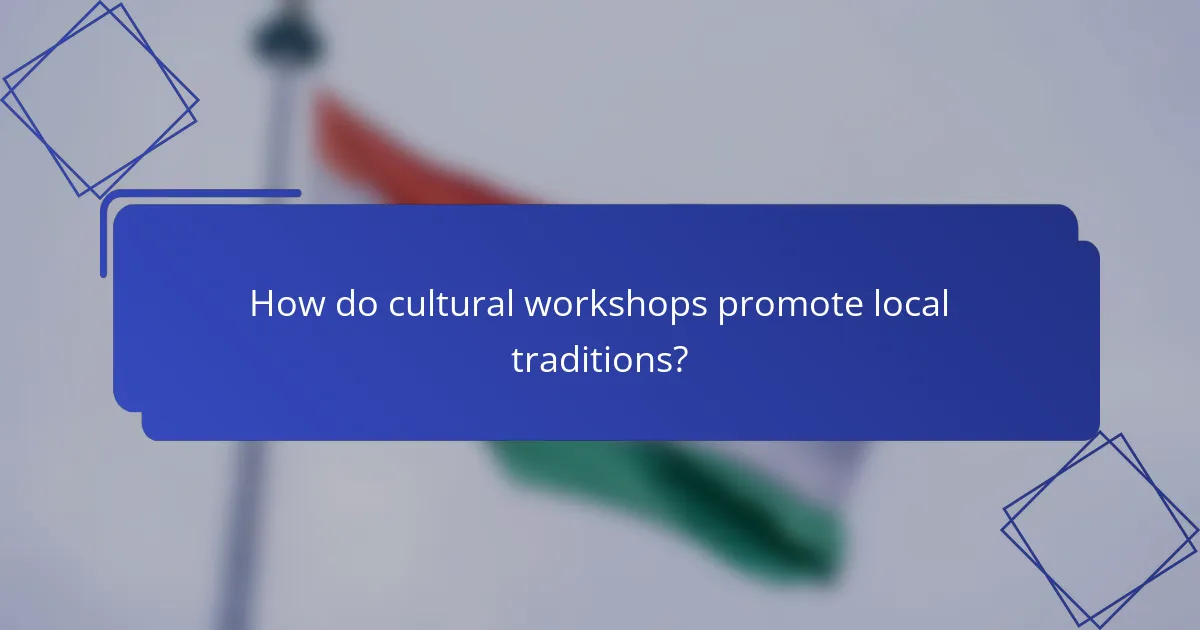
How do cultural workshops promote local traditions?
Cultural workshops play a vital role in promoting local traditions by providing hands-on experiences that connect participants with their heritage. These interactive sessions foster appreciation and understanding of traditional practices, ensuring they are passed down through generations.
Preservation of indigenous practices
Cultural workshops often focus on indigenous practices, teaching skills such as traditional crafts, music, and dance. By engaging participants in these activities, workshops help to keep these practices alive, allowing individuals to experience and appreciate their cultural significance firsthand.
For example, a workshop on pottery might involve local artisans demonstrating techniques passed down for centuries, enabling participants to create their own pieces while learning about the history and meaning behind the craft.
Celebration of regional festivals
Workshops frequently coincide with regional festivals, enhancing the celebratory atmosphere and encouraging community participation. These events often include traditional food preparation, dance, and music, allowing attendees to immerse themselves in the local culture.
Participating in a workshop during a harvest festival, for instance, might involve learning how to prepare traditional dishes using locally sourced ingredients, fostering a sense of community and continuity with the past.
Engagement with local history and storytelling
Cultural workshops provide a platform for sharing local history and storytelling, which are essential components of cultural identity. Through interactive sessions, participants can learn about significant historical events, legends, and folklore that shape their community’s narrative.
For example, a workshop might include storytelling sessions where elders share tales of the region’s history, helping younger generations connect with their roots and understand the values that define their culture.
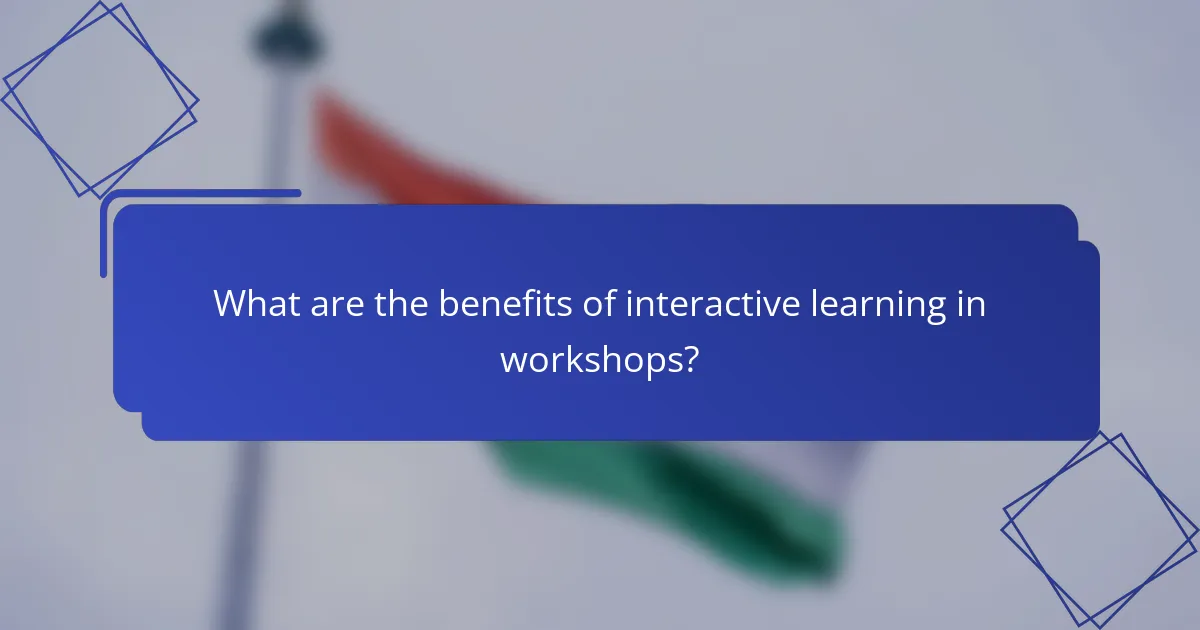
What are the benefits of interactive learning in workshops?
Interactive learning in workshops enhances engagement and skill acquisition through hands-on experiences and active participation. This approach fosters a deeper understanding of local traditions and techniques, making the learning process more effective and enjoyable.
Enhanced retention of skills
Interactive learning significantly improves skill retention by allowing participants to practice techniques in real-time. Engaging directly with the material helps solidify knowledge, making it easier to recall and apply skills later. For instance, a pottery workshop where participants mold clay under guidance can lead to better retention than simply watching a demonstration.
To maximize retention, workshops should incorporate varied activities such as demonstrations, hands-on practice, and discussions. This variety caters to different learning styles and keeps participants actively involved.
Immediate feedback from instructors
One of the key advantages of interactive workshops is the ability to receive immediate feedback from instructors. This real-time guidance allows participants to correct mistakes and refine their techniques on the spot, leading to quicker improvement. For example, in a cooking class, an instructor can provide instant tips on knife skills or seasoning adjustments.
To benefit from this feedback, participants should be open to constructive criticism and actively seek clarification when needed. Engaging with instructors during the process can enhance learning outcomes significantly.
Opportunities for peer collaboration
Interactive workshops often encourage collaboration among participants, fostering a sense of community and shared learning. Working together on projects or tasks allows individuals to exchange ideas and techniques, enriching the overall experience. For instance, in a dance workshop, practicing in pairs can help participants learn from each other’s strengths.
To leverage peer collaboration effectively, participants should be encouraged to share their insights and support one another. Group activities can enhance creativity and lead to innovative approaches to traditional skills.
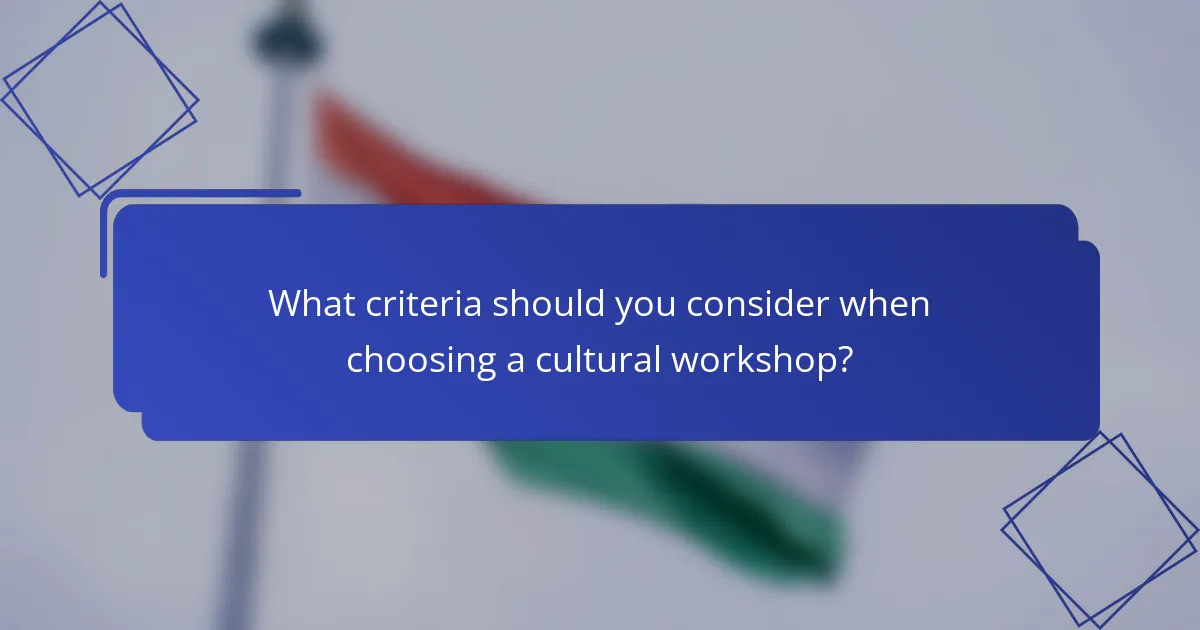
What criteria should you consider when choosing a cultural workshop?
When selecting a cultural workshop, consider the instructor’s qualifications, the duration and schedule of the workshop, and the overall cost including materials. These factors will help ensure a meaningful and enriching experience that aligns with your learning goals.
Instructor qualifications and experience
The instructor’s background is crucial for a quality cultural workshop. Look for educators with formal training in the subject matter, as well as practical experience in the local traditions they teach. A strong portfolio or testimonials can provide insight into their teaching effectiveness and engagement style.
Additionally, consider the instructor’s ability to connect with participants. Workshops led by passionate and knowledgeable instructors often foster a more interactive and immersive learning environment.
Workshop duration and schedule
Workshop duration can vary significantly, typically ranging from a few hours to several days. Assess your availability and the depth of learning you seek; shorter workshops may provide a quick overview, while longer sessions often allow for more hands-on practice and exploration.
Check the schedule for flexibility. Some workshops may offer multiple sessions or weekend options, making it easier to fit into your calendar. Ensure that the timing aligns with your personal commitments to maximize participation.
Cost and materials included
Costs for cultural workshops can vary widely, often depending on the length and complexity of the session. Expect to pay anywhere from a modest fee for a single class to higher amounts for comprehensive courses that include materials and resources.
Inquire about what materials are included in the fee. Some workshops provide all necessary supplies, while others may require participants to bring their own. Understanding these details can help you budget effectively and avoid unexpected expenses.
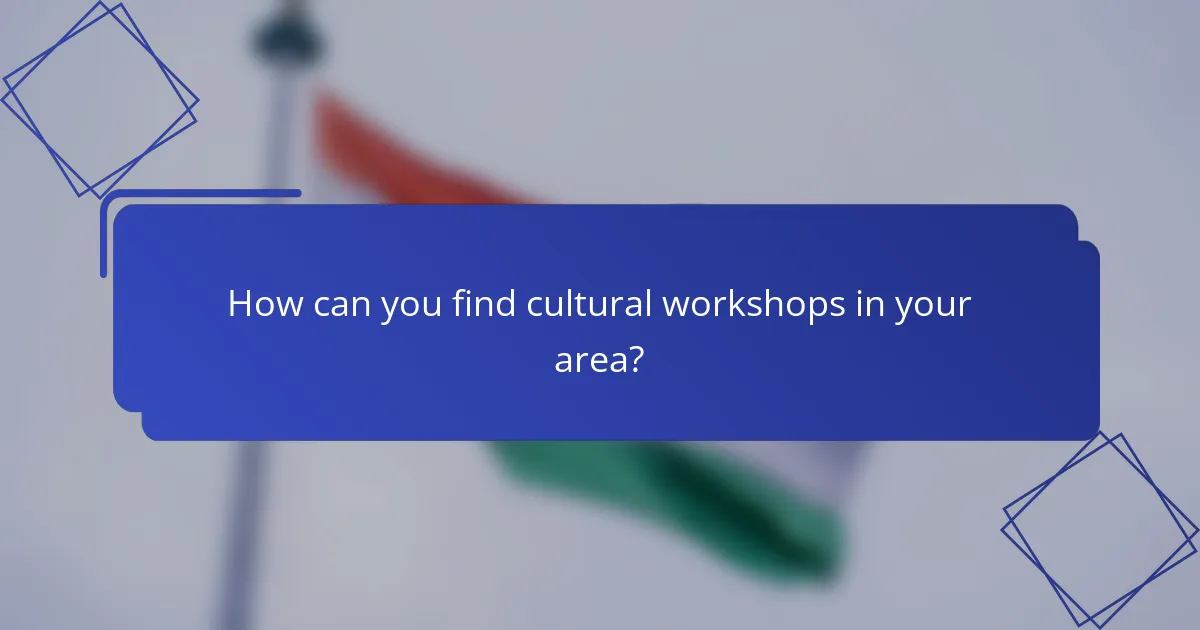
How can you find cultural workshops in your area?
Finding cultural workshops in your area can be done through various local resources and online platforms. These workshops often focus on skill development, local traditions, and interactive learning, making them valuable for community engagement.
Local community centers and cultural organizations
Local community centers and cultural organizations are excellent starting points for discovering workshops. Many of these centers regularly host events that celebrate local traditions and offer skill-building opportunities. Check bulletin boards or websites for schedules and details.
Consider visiting centers that focus on specific cultural practices, such as art, music, or dance. They often provide hands-on experiences led by knowledgeable instructors, which can enhance your learning and appreciation of the culture.
Online platforms like Eventbrite and Meetup
Online platforms such as Eventbrite and Meetup are convenient ways to find cultural workshops tailored to your interests. These sites allow you to filter events by location, date, and type, making it easy to discover relevant workshops nearby.
When using these platforms, read reviews and descriptions carefully to ensure the workshops meet your expectations. Look for events that encourage interaction and participation, as these will provide a richer learning experience.
